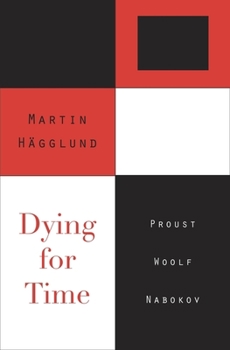Dying for Time: Proust, Woolf, Nabokov
Marcel Proust, Virginia Woolf, and Vladimir Nabokov transformed the art of the novel in order to convey the experience of time. Nevertheless, their works have been read as expressions of a desire to transcend time--whether through an epiphany of memory, an immanent moment of being, or a transcendent afterlife. Martin H gglund takes on these themes but gives them another reading entirely. The fear of time and death does not stem from a desire to transcend time, he argues. On the contrary, it is generated by the investment in temporal life. From this vantage point, H gglund offers in-depth analyses of Proust's Recherche, Woolf's Mrs. Dalloway, and Nabokov's Ada.
Through his readings of literary works, H gglund also sheds new light on topics of broad concern in the humanities, including time consciousness and memory, trauma and survival, the technology of writing and the aesthetic power of art. Finally, he develops an original theory of the relation between time and desire through an engagement with Freud and Lacan, addressing mourning and melancholia, pleasure and pain, attachment and loss. Dying for Time opens a new way of reading the dramas of desire as they are staged in both philosophy and literature.Format:Hardcover
Language:English
ISBN:0674066324
ISBN13:9780674066328
Release Date:October 2012
Publisher:Harvard University Press
Length:208 Pages
Weight:1.00 lbs.
Dimensions:0.9" x 6.2" x 9.3"
Customer Reviews
0 rating





